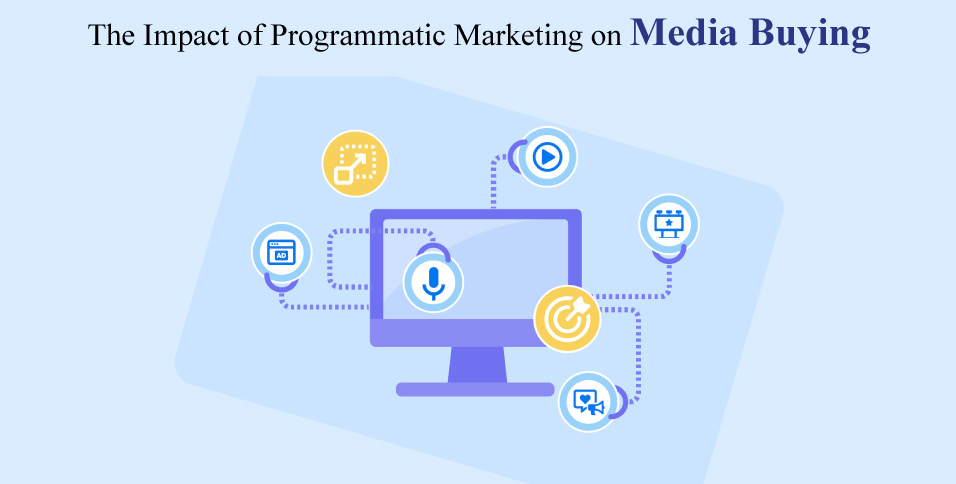As it stands, it seems like there are new techniques and tools reshaping how marketers reach their audiences almost every year. One such innovation is programmatic marketing, which has revolutionised the media buying process. For those interested, we have put together some information into the core components of programmatic marketing, its transformative impact on the media buying landscape and the benefits and challenges it presents for businesses.
Programmatic Marketing Explained
Programmatic marketing automates the buying and selling of digital advertising space in real-time. It uses advanced algorithms and data insights to optimise the ad placements, targeting, and pricing which streamlines what was once a manual and time-consuming series of processes.
Key Components
- Real-Time Bidding (RTB): RTB is an auction-based system where advertisers bid on individual ad impressions in real-time. The highest bidder wins the placement, ensuring efficient use of ad budgets.
- Programmatic Direct: This approach allows advertisers to negotiate fixed pricing and inventory directly with publishers, bypassing the auction system for more controlled and predictable ad placements.
- Private Marketplaces (PMP): PMPs offer an invitation-only marketplace where advertisers can access premium inventory from specific publishers at pre-negotiated rates.
Critical Tools
- Demand-Side Platforms (DSPs): DSPs enable advertisers to manage and optimise their programmatic ad campaigns and offer tools for bidding, targeting, and reporting.
- Supply-Side Platforms (SSPs): SSPs allow publishers to manage and sell their ad inventory, optimising pricing and fill rates to maximise revenue.
- Data Management Platforms (DMPs): DMPs collect, store, and analyse audience data, allowing for detailed audience segmentation and informed targeting strategies.
The Transformative Impact on Media Buying
Programmatic marketing has fundamentally altered the media buying landscape. Traditional media buying relied heavily on human negotiation and manual processes, which were both time-consuming and prone to errors. In contrast, programmatic marketing automates these processes, making them faster, more accurate, and efficient.
Main Benefits
- Efficiency and Cost Savings: Automating the media buying process reduces the time and resources needed to manage campaigns, leading to greater efficiency and lower costs for any media buying agency.
- Enhanced Targeting and Personalisation: With access to vast amounts of real-time audience data, advertisers can now target specific demographics, behaviours, and interests more precisely, delivering highly relevant and personalised ads.
- Real-Time Optimisation: Advertisers can monitor campaign performance in real-time, making adjustments to targeting, bidding, and creative elements as needed to maximise return on investment (ROI).
- Transparency and Control: Programmatic platforms provide detailed insights into ad placements, performance, and pricing, giving advertisers greater transparency and control over their campaigns.
Potential Challenges
Despite its numerous advantages, programmatic marketing also presents some challenges:
- Data Privacy and Security: The extensive use of data necessitates strict compliance with data protection regulations to ensure audience information remains secure.
- Ad Fraud and Viewability Issues: Non-human traffic and ads served in non-viewable locations can affect campaign effectiveness. Advertisers must be vigilant in monitoring and addressing these issues.
- Learning Curve and Skill Demand: Effective programmatic marketing requires a specialised skill set and familiarity with various platforms and technologies. Businesses may need to invest in training or hire experienced professionals.
Artificial Intelligence (AI)
AI significantly enhances programmatic marketing by enabling better targeting, real-time optimisation, dynamic creative adjustments, fraud prevention, and predictive analytics. AI-driven insights allow marketers to make more informed decisions, improving the overall efficiency and effectiveness of their campaigns.
Programmatic marketing has revolutionised the way advertisers buy media, providing a more efficient, data-driven approach that allows for precise targeting and real-time optimisation. While it brings numerous benefits, it also comes with challenges that require careful management. By understanding and leveraging the power of programmatic marketing, businesses can achieve better results and stay ahead of the game.
Also Read: What is Influencer Affiliate Marketing? A Guide for Brands















